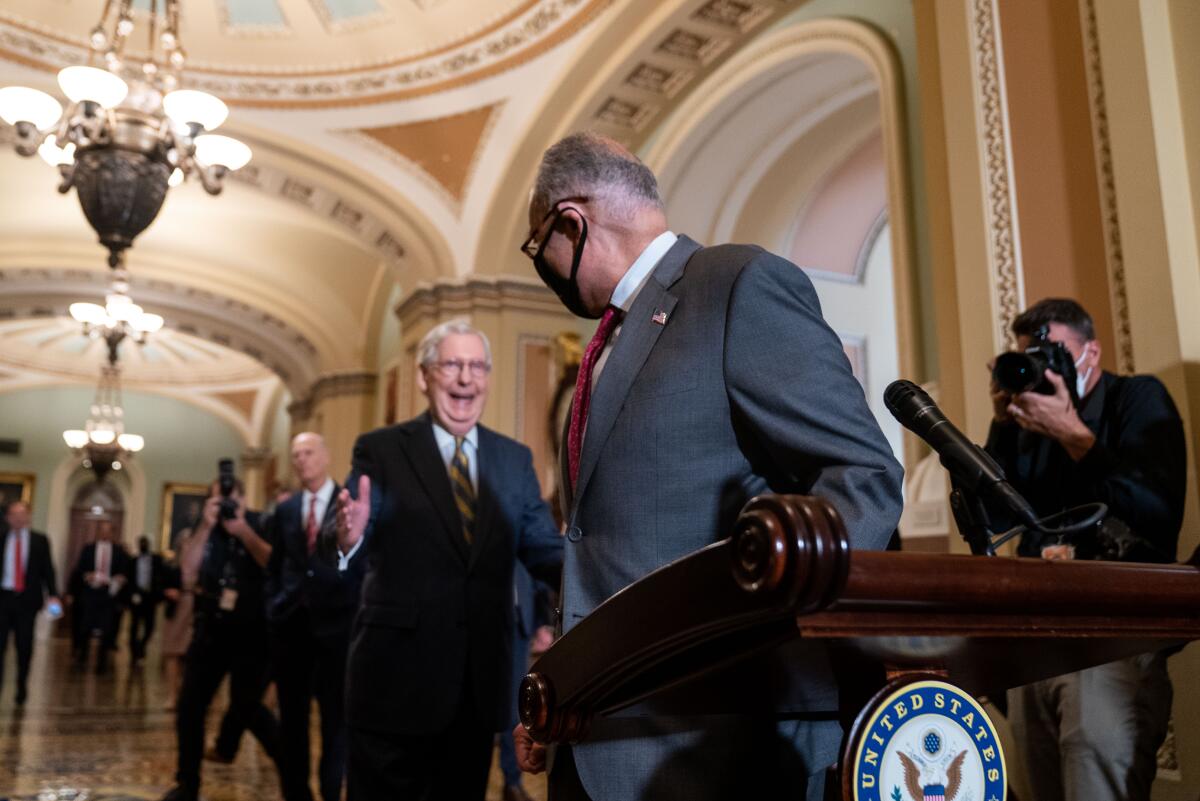Column: Why journalists are failing the public with ‘both-siderism’ in political coverage

American politics has changed dramatically since my post-Watergate generation of journalists began covering the story. Political journalism hasn’t kept up.
For years it was easy to cover “both sides” — Republicans and Democrats — as equally worthy, and blameworthy, partners in democracy. While we reporters had come of age as witnesses to the unprecedented resignation of a Republican president who’d tried to corrupt the institutions of government to affect an election — imagine! — what remained was a Republican Party still capable of a creditable role in a healthy two-party system. After all, Richard M. Nixon was forced to resign when congressional leaders of his party began abandoning him. Again, imagine that, Kevin McCarthy.
Now, when reporters or pundits use the words “both sides” in regard to some political problem, I stop reading or listening.
I started to chafe at false equivalence a quarter-century ago, as a congressional reporter amid Newt Gingrich’s Republican revolution. One party — his — was demonstrably more responsible for the nasty divisiveness, government gridlock and norm-busting, yet journalistic pressure to produce seemingly “balanced” stories — pressure both ingrained and imposed by editors — prevented reporters from sufficiently reflecting the new truth.
By 2012, as President Obama dealt with the willful obstructionists, conspiracists and racists of an increasingly radicalized Republican Party, political scientists and long-respected Washington watchers Thomas E. Mann and Norman J. Ornstein put the onus for the dysfunction squarely on the GOP in their provocative book “It’s Even Worse Than It Looks.” Significantly, they implicated journalists: “A balanced treatment of an unbalanced phenomenon is a distortion of reality and a disservice to your consumers.”
The ascension of Donald Trump four years later should not have been such a surprise. With his continued hold on the Republican Party in the Biden era, Mann and Ornstein’s admonition is truer than ever.
Yes, it’s critical for political journalists to remain fair and balanced, in contrast with the right-wing network that cynically co-opted those adjectives. And, yes, variations on the word “lie” justifiably made it into the mainstream — something I never thought I’d see, let alone write — to describe what comes out of Trump’s mouth whenever his lips move. Sadly, that was progress.
Yet, now that Trump is no longer president and his words no longer can fire senior officials, move troops or launch bombs, his unhinged utterances go largely uncovered, for better and worse. Better, for everyone’s mental health. Worse, because he is the favorite to be Republicans’ 2024 nominee and perhaps president again, and still commands his party — enabled by his sycophants in Congress, state capitals and thousands of local public offices. Attention must be paid.
To the extent, then, that journalists and pundits focus critically on President Biden and Democrats and give short shrift to Republicans’ obstructions — as if the cancer of Trumpism was in remission, if not cured — that indeed distorts reality and disserves readers, listeners and viewers.
Democracy is literally at stake: As Republicans block federal voting rights legislation, those in red states continue to challenge the 2020 votes for Biden (but not their own), pass laws to suppress future votes in ways disadvantageous to Democrats, gerrymander legislative districts and replace nonpartisan election overseers with partisan ones.
In Congress, the Democrats’ disarray, to use a favorite alliterative phrase of journalists, is real and merits dissection. But it must be said that it owes much to the fact that Democrats, with their minimal House and Senate majorities, can’t count on a single Republican vote for most legislation, while one Republican senator can routinely block action with a filibuster.
Meanwhile, the scrapping between liberals such as Sen. Bernie Sanders of Vermont and moderate Democratic holdouts Sens. Joe Manchin III of West Virginia and Kyrsten Sinema of Arizona over potentially transformative domestic spending proposals reflects the normal debate process.
Numerous news reports suggest that Biden is politically liable for the persistence of COVID-19. Yet many are silent on Republicans’ opposition to his efforts promoting vaccines and masks, and the not coincidental fact that the rates of hospitalizations and deaths are highest in red states. Trumpists on social media seem to gloat over high case numbers. “COVID is raging out of control,” Trump himself said in an anti-Biden statement Wednesday. “Do you miss me yet?”
This is a Republican Party that is not serious about governing or addressing the nation’s actual problems, as opposed to faux ones like critical race theory.
Healthcare costs, child care, climate change, income inequality, you name it — Republicans don’t even acknowledge the problems, let alone propose solutions. Statewide candidates from Nevada to Virginia echo Trump in claiming that addressing (nonexistent) election fraud is, as he put it in another statement Wednesday, “the single most important thing for Republicans to do.”
Republicans in Congress scandalously opposed a bipartisan commission to investigate the Jan. 6 insurrection, which threatened them as well as our democracy. They won’t support a must-pass increase in the nation’s debt limit, despite the trillions of debt that they and Trump piled up. Yet it was Sen. Charles E. Schumer of New York, the Democratic majority leader, who came in for pundits’ rebuke last week when he lambasted Republicans for flirting with a default, just after they’d allowed a temporary debt-limit measure to pass. What was he supposed to do? Celebrate the Republicans’ “bipartisanship” in defusing, only until December, the dynamite they’d lit under the economy?
On Saturday, the Senate’s most senior Republican, Sen. Charles E. Grassley, gleefully accepted Trump’s endorsement for reelection at a rally in Iowa where Trump repeatedly lied that he’d beaten Biden. The next day on “Fox News Sunday,” the second-ranking Republican in the House, Rep. Steve Scalise of Louisiana, repeatedly refused to say that the election was not stolen from Trump.
Democrats can’t be expected to deal with these guys like they’re on the level. Nor should journalists cover them as if they are.
More to Read
A cure for the common opinion
Get thought-provoking perspectives with our weekly newsletter.
You may occasionally receive promotional content from the Los Angeles Times.











